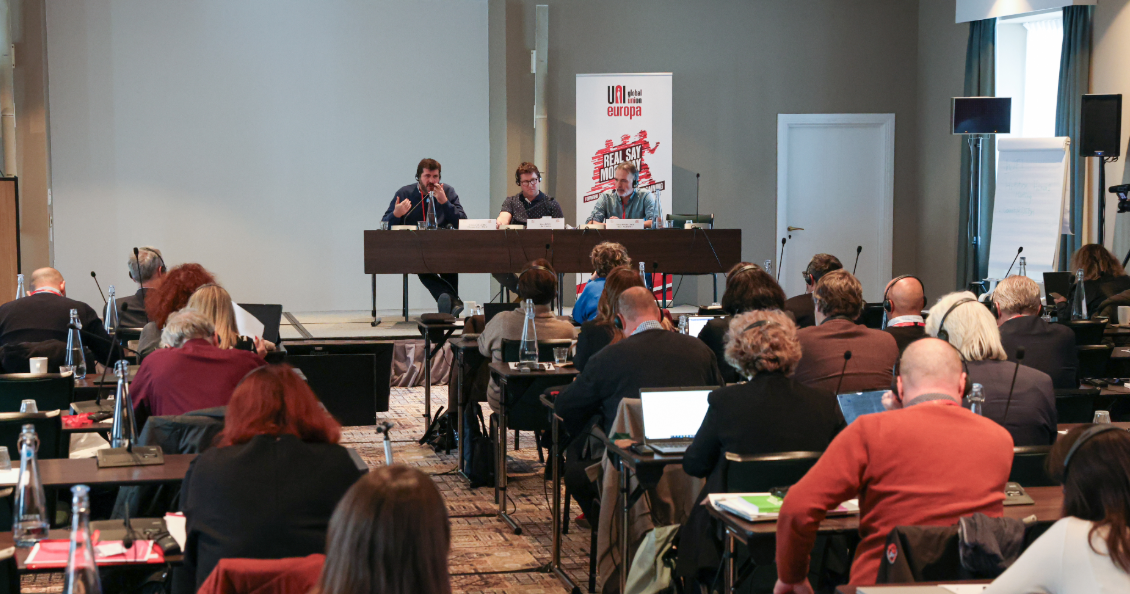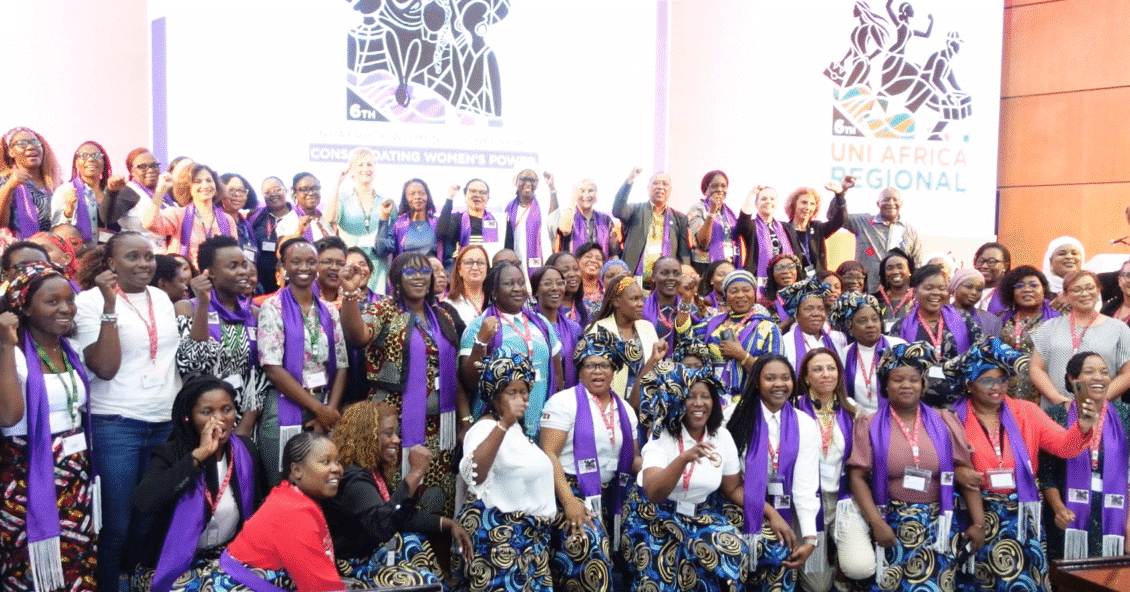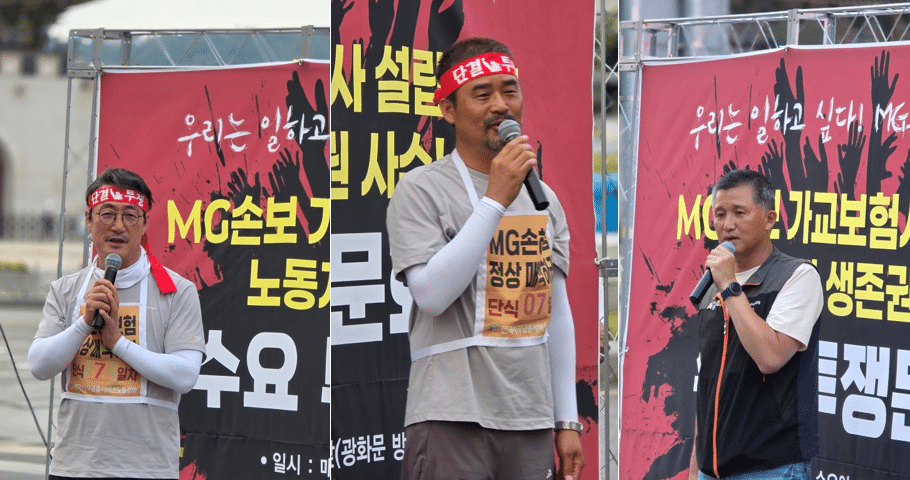Unions gather to share stories of successful mobilisation
28.11.24
At a flagship conference organised by UNI Europa in Brussels, dozens of union leaders, officers and shop stewards gathered to share stories of and strategies for successful mobilisation.
At UNI Europa’s recent flagship Conference on Trade Union Mobilisation, dozens of union leaders, officers and shop stewards came together to share stories of and strategies for successful mobilisation. The Conference took place on 26 November 2024 in Brussels, four months ahead of UNI Europa’s 6th Statutory Conference in Belfast, where over 800 union leaders from across Europe will deepen these discussions to agree on leadership and strategy for the next four years.
Oliver Roethig, UNI Europa Regional Secretary, opened the Conference by emphasising the growing divide between corporate profits and workers’ real wages. “Over the past years, we have seen employers make enormous profits, while workers’ real-term wages have been squeezed. But workers and their unions have also mobilised for better pay and conditions,” he said.
He outlined UNI Europa’s key strategies to build worker power and strengthen collective bargaining. First, bottom-up, building up unions’ organising capacity. Second, top-down, influencing the EU to provide a legal and political framework that promotes rather than diminishes collective bargaining. Third, as the federation of member unions, directly engaging with multinationals to make them engage in collective bargaining wherever they operate.
The Conference on Trade Union Mobilisation reflected these priorities, structured in four sessions that delved into company-level, sectoral and political mobilisations.

Michal Szmagaj, a union organiser from COZZ in Poland, described how UNI’s global agreement with Teleperformance transformed their ability to organise in the company, seeing a 600 per cent increase in membership within a few months after a resistant management team was replaced, having failed to adapt to the new global agreement. Moreover, it gave the union enough leverage to begin to bargain collectively negotiations. However, the workers and organisers faced one big challenge: How to mobilise employees working remotely and spread out across the whole country? To address this, they embraced digital communication tools like Discord and email campaigns. Workers united by changing their profile pictures to pro-union imagery and bombarding the CEO with emails. “We should trust workers and their ability to mobilise,” Szmagaj stated.
Peter Hellberg, President of Unionen and UNI Europa, shared the unconventional approach they took in Sweden with fintech company Klarna. “We were used to first having collective agreements, then organising,” he said. However, when Klarna’s management refused to negotiate, the unions changed tactic , organising first to build leverage. And ultimately, also through the threat of striking, they were able to push Klarna to join the Banks Employer Organisation and be covered by the applicable collective agreement in the sector. Hellberg also highlighted Spotify as an anti-union case. Rather than negotiating with unions to address Sweden’s midnight-to-5 a.m. work ban, Spotify attempted to change national law instead. But both with Spotify and Google, the success at Klarna has helped Unionen to get tech workers interested in the benefits of joining a trade union.

Andrea Kocsis, Deputy Chairwoman of Germany’s ver.di, recounted how, in 2023, a transparent and participatory industrial strategy culminated in one of their largest strikes in the postal sector. First, the union surveyed more than 40,000 members on their demands for a pay increase, eventually agreeing on 15 per cent. After a series of warning strikes that did not lead to an agreement with Deutsche Post AG, over 66,000 workers and ver.di members decided to go on an indefinite strike. Deutsche Post AG lost over 100,000 work days to the strike, persuading it to sign an agreement with the union, which gained thousands of members in the process.
In Italy, Alessio Di Labio, National Secretary of Filcams CGIL, explained their method of turning worker grievances into a “shopping list” for collective agreements. When negotiations for a renewed sectoral agreement in the retail sector stalled, strike action proved essential. The unions successfully mobilised workers, with over 80 per cent in some supermarkets walking out on strike. “Through the union, the workers were no longer alone in the face of the employer,” Di Labio concluded.
Towards the end of 2020, at the height of the pandemic, thousands of security guards across the whole of Norway went on an unprecedented eleven-week strike for a pay rise in line with industrial wages. This strike – one of the longest in recent Norwegian history – led to a partial shut down of gas exports from the country. “In Norway, you have to go on strike until you get an agreement”, explained Terje Mikkelsen, National Secretary from Norsk Arbeidsmandsforbund and President of UNI Europa Private Security Services. “Once the strike was called, we didn’t even have to do anything. It sent an electric shock through workers and the shop floor, they almost organised actions and protests by themselves”, Terje Mikkelsen declared. He emphasised the vital role of shop stewards. “If we did not have shop stewards, we would be much weaker,” he said, crediting their proactive efforts for increased membership and engagement.
Session III: Mobilising at the political level
Lieveke Norga, General Secretary of ACV Puls, described a union victory in Belgium against a 2023 law that targeted union members and other activists under the guise of “security concerns.” By forging alliances with other movements, unions successfully pressured the government to withdraw the measure. “Joining forces was the secret to our victory,” Norga concluded.
Susan Fitzgerald, Regional Secretary of Unite the Union in Northern Ireland, spoke about how private sector workers started a historic strike wave in Northern Ireland in 2022. After Covid-19 and the cost-of-living crisis, these workers were getting double digit pay rises. This was crucial in building confidence when, after the 2022 elections, Northern Ireland was without a government for two years due to a political stalemate between unionist and republican parties. With the ensuing problems of public infrastructure and maintenance, multiple unions came together in a 24-hour strike, with 100,000 workers taking to the streets, successfully unblocking the situation. “When you fight, you can win,” Fitzgerald concluded.
In Europe, the left-wing government in Spain has stood out as a beacon of progressive change, having passed Europe’s first paid menstrual leave law in 2023. Pilar Rato, International Secretary of CCOO-Servicios and 1st Vice-President of UNI Europa, celebrated how unions managed to mobilise for this landmark achievement. “For too long, menstruation, maternity, and menopause were treated as private matters,” Rato said. “This law recognises the needs of women and builds equality into our constitution.”

Dave Ward, General Secretary of CWU, spoke about how his union built the New Deal for Workers campaign – and won legislative victories under the new Labour government. But the CWU is not naive about the balance of power and the need to keep mobilising for political change. Ward said: “We need to mobilise members and shop stewards to pressure the Labour Party to build on the legislative progress that we have made when it comes to a single employment status, sectoral bargaining and so on.”
Mounya Mehdaoui, Trade Union Officer at FGTB-ACCG in the cleaning sector, explained how over a thousand essential workers mobilised in Brussels on 1 October 2024 against lowest-price competition in public procurement, in an action coordinated by UNI Europa. “The workers and cleaners mobilised through emotion, anger, frustration and the feeling of injustice.” As the European Commission is moving forward with a reform of public procurement, we need to keep mobilising from local to regional, national and European levels for better social procurement practices.
In Ireland, where unionisation faces significant legal hurdles, Ethel Buckley of SIPTU outlined the Respect at Work campaign launched by four unions including CWU, Mandate and FSU. By forming coalitions and presenting clear policy demands, they have been pushing for new legislation to make collective bargaining a statutory right. “We have created a union coalition to ensure workers’ rights are central in upcoming elections,” Buckley explained, referring to the elections in the Republic of Ireland on 29 November. “And we have succeeded in making collective bargaining a topic in these elections.” She added that “a lot of our work went into educating our own members and shop stewards to get them ready to move when we need them to politically.”
Keep mobilising, keep winning
The conference closed with remarks from Peter Hellberg: “If we stand together, organise and keep pushing, we can win,” he affirmed. Hellberg underscored the importance of alliances and shared practices as UNI Europa prepares for the upcoming Conference in Belfast.
As trade unions continue to grapple with challenges such as anti-union legislation, hostile corporations, and evolving work environments, the strategies and stories shared at this Conference offered a roadmap to build a stronger labour movement. From grassroots organising to sector-wide strikes and political advocacy, the message was clear: solidarity is the key to transforming workplaces and societies.




